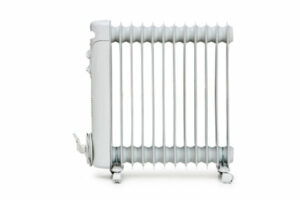Oil radiators

Electric oil radiators are small portable heaters that allow rapid heating as needed and without much work. They are called oil radiators as the heat-carrying agent is oil, which is more appropriate in this case than water.
The inconvenience of these appliances is that a large part of the energy is lost during the transformation of electricity into heat. Modern appliances make a more efficient use of electricity but this efficiency is still low in comparison to central heating systems. Thus, for financial reasons such appliances should only be used occasionally and if necessary.
Oil radiators are rarely necessary in modern houses. Even in older buildings, thermal protection and heating are changed during renovation works and this type of additional radiators is only seldom used.
Used oil radiators should in no case be disposed off as used metal even if they are, for a large part, made out of metal. Oil was contaminated by PCB – polychlorinated biphenyl –that is extremely toxic. The European Community has only forbidden the commercialization of PCB in 1986. Given that radiators with PCB are not marked with a sign showing the oil composition, never dismount these appliances yourself and try to extract the oil.
Where to dispose of oil radiators in an appropriate way ?
The SDK, as a partner of Ecotrel, which organizes the collection of electric and electronic waste, collects the oil radiators at the collection sites (be they mobile or in Resources Centers). The collected appliances are than dismounted by qualified staff and according to state of the art techniques with the reliability required by the SuperDrecksKëscht® center in Colmar-Berg.
Electric parts are dismounted and recycled. An oil sample is taken from every radiator and analyzed in the lab in order to assess the PCB contamination. If no PCB is found in the sample and the quality criteria are met, the oil is collected in tanks and treated in a refinery. The metal case is recycled together with other metals.
If the sample contains PCB, the contaminated oil is collected separately and the radiator is washed several times with special liquids. The metal frame is recycled together with other metals. The contaminated washing liquid and the oil are treated in a special installation (high temperature incinerator).

Oil radiators
Electric oil radiators are small portable heaters that allow rapid heating as needed and without much work. They are called oil radiators as the heat-carrying agent is oil, which is more appropriate in this case than water.
The inconvenience of these appliances is that a large part of the energy is lost during the transformation of electricity into heat. Modern appliances make a more efficient use of electricity but this efficiency is still low in comparison to central heating systems. Thus, for financial reasons such appliances should only be used occasionally and if necessary.
Oil radiators are rarely necessary in modern houses. Even in older buildings, thermal protection and heating are changed during renovation works and this type of additional radiators is only seldom used.
Used oil radiators should in no case be disposed off as used metal even if they are, for a large part, made out of metal. Oil was contaminated by PCB – polychlorinated biphenyl –that is extremely toxic. The European Community has only forbidden the commercialization of PCB in 1986. Given that radiators with PCB are not marked with a sign showing the oil composition, never dismount these appliances yourself and try to extract the oil.
Where to dispose of oil radiators in an appropriate way ?
The SDK, as a partner of Ecotrel, which organizes the collection of electric and electronic waste, collects the oil radiators at the collection sites (be they mobile or in Resources Centers). The collected appliances are than dismounted by qualified staff and according to state of the art techniques with the reliability required by the SuperDrecksKëscht® center in Colmar-Berg.
Electric parts are dismounted and recycled. An oil sample is taken from every radiator and analyzed in the lab in order to assess the PCB contamination. If no PCB is found in the sample and the quality criteria are met, the oil is collected in tanks and treated in a refinery. The metal case is recycled together with other metals.
If the sample contains PCB, the contaminated oil is collected separately and the radiator is washed several times with special liquids. The metal frame is recycled together with other metals. The contaminated washing liquid and the oil are treated in a special installation (high temperature incinerator).






